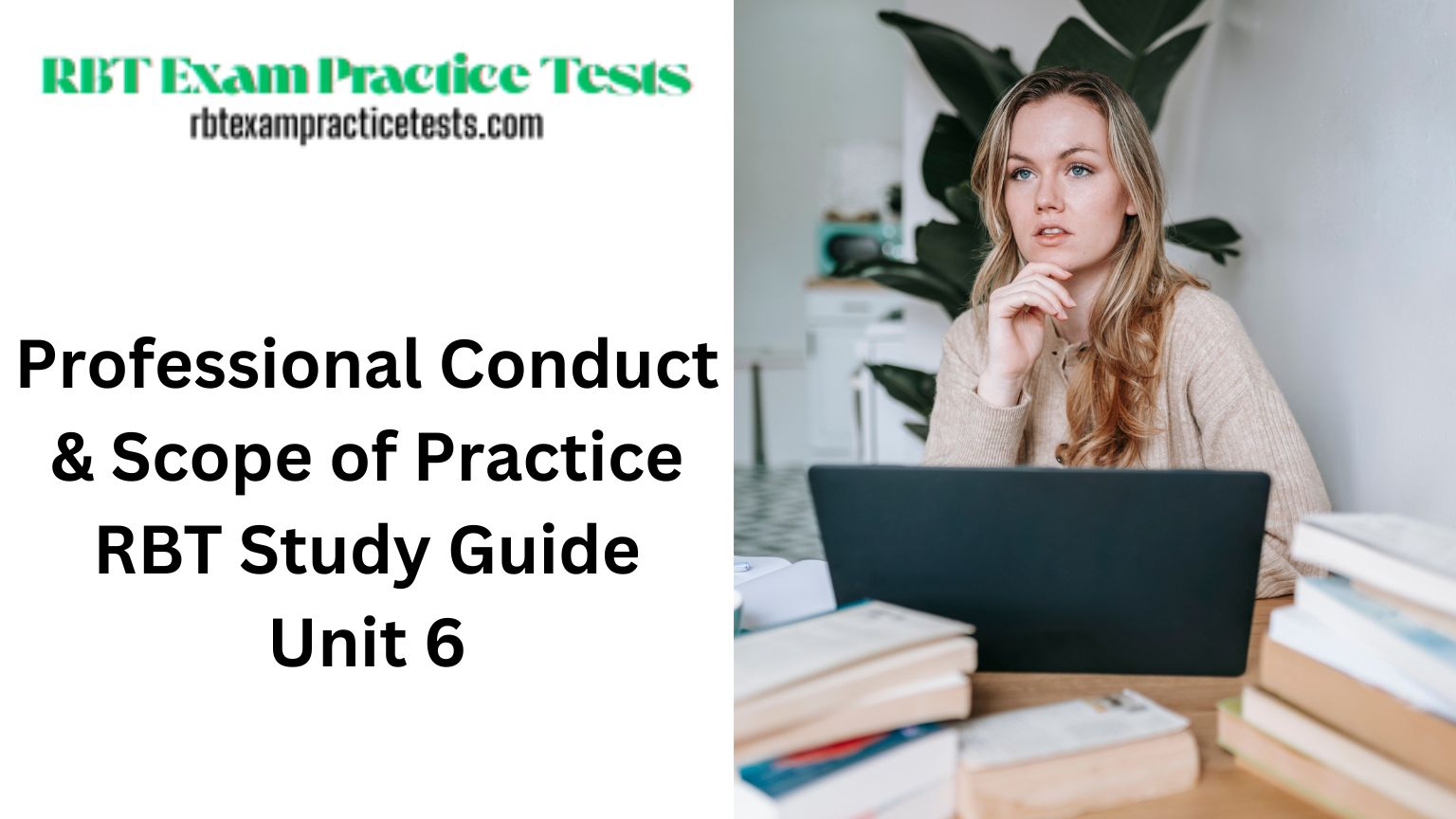Professional Conduct & Scope of Practice: RBT Study Guide Unit 6
Master the essentials of professional conduct and scope of practice for the RBT Exam 2025. Boost your preparation with our expert guide.
Why Professional Conduct Matters
Professional conduct and scope of practice are critical for Registered Behavior Technicians (RBTs), accounting for 15% of the RBT exam. These principles ensure ethical, safe, and effective delivery of Applied Behavior Analysis (ABA) therapy. Adhering to the Behavior Analyst Certification Board (BACB) guidelines protects clients and maintains professional integrity. This guide dives into Unit 6 of the RBT Task List 2.0, offering insights to excel in your certification journey.
RBTs work directly with clients under BCBA supervision, implementing treatment plans with compassion and respect. Understanding your role and boundaries prevents harm and ensures high-quality care.
[](https://rbtpracticetest.com/rbt-study-guide/professional-conduct/)BACB Ethical Guidelines for RBTs
The BACB’s RBT Ethics Code outlines responsibilities to clients, colleagues, and the profession. Key principles include:
- Client Dignity: Treat clients, caregivers, and stakeholders with respect, empathy, and compassion, regardless of their abilities or needs.
- Confidentiality: Protect client privacy in all settings, including social media and casual conversations. [](https://rbtpracticetest.com/rbt-competency-assessment/)
- Autonomy: Honor client assent and withdrawal, respecting their choices and preferences.
- Cultural Sensitivity: Acknowledge and respect cultural, religious, and personal differences.
- Positive Reinforcement: Prioritize reinforcement over punishment to encourage positive behavior.
Violating these guidelines risks certification loss, making adherence essential. Review the BACB RBT Ethics Code for detailed expectations.
[](https://aba.rocks/quiz/)Supervision Requirements
RBTs work under the supervision of a Board Certified Behavior Analyst (BCBA) or Board Certified Assistant Behavior Analyst (BCaBA). The BACB mandates:
- At least 5% of monthly direct ABA hours must be supervised.
- Two face-to-face supervision sessions per month, with at least one being individual.
- Supervisors provide feedback on performance, ethics, and interventions.
- RBTs must report unmet supervision requirements to the BACB.
Supervision ensures RBTs implement treatment plans correctly and grow professionally. Document all supervision hours to maintain compliance.
[](https://rbtpracticetest.com/rbt-study-guide/professional-conduct/)Handling Feedback Professionally
Feedback is vital for professional growth. RBTs receive feedback from supervisors, colleagues, or self-assessments. Best practices include:
- Active Listening: Listen to feedback without defensiveness.
- Clarification: Ask respectful questions to understand suggestions.
- Implementation: Apply feedback to improve performance.
- Gratitude: Thank supervisors for constructive feedback, fostering collaboration.
For example, if a BCBA suggests adjusting a prompting strategy, reflect on the feedback and implement changes to enhance client outcomes.
[](https://www.iprep.online/courses/rbt-exam-practice/)Maintaining Professional Boundaries
Professional boundaries protect clients and RBTs. Key guidelines include:
- Social Media: Avoid sharing client information or accepting friend requests from clients’ families. [](https://rbtpracticetest.com/rbt-competency-assessment/)
- Physical Boundaries: Use touch only when necessary for teaching or safety.
- Financial Boundaries: Avoid financial entanglements beyond approved billing.
- Communication: Use respectful language and follow the chain of command.
Overstepping boundaries, such as discussing a client’s progress in public, can lead to ethical violations. Always prioritize professionalism.
[](https://rbtpracticemockexam.com/rbt-professional-conduct-and-scope-of-practice/)Practice with Our RBT Quizzes
Test your knowledge of professional conduct and scope of practice with our targeted quizzes, designed to mimic real RBT exam scenarios:
- RBT Professional Conduct and Scope of Practice Quiz 1
- RBT Professional Conduct and Scope of Practice Quiz 2
- RBT Professional Conduct and Scope of Practice Quiz 3
- RBT Professional Conduct and Scope of Practice Quiz 4
These quizzes cover supervision, feedback, and ethical scenarios to boost your confidence for the 2025 RBT exam.
Tips for Mastering Unit 6
To excel in professional conduct and scope of practice, follow these strategies:
- Study the BACB RBT Ethics Code: Memorize key principles and apply them to real-world scenarios.
- Practice Scenario-Based Questions: Use mock exams to familiarize yourself with ethical dilemmas. [](https://rbtpracticemockexam.com/rbt-professional-conduct-and-scope-of-practice/)
- Seek Feedback: Regularly consult your BCBA to refine your skills.
- Stay Updated: Review the latest BACB guidelines for 2025 to ensure compliance.
Consistent practice and ethical awareness will set you apart as a competent RBT.
[](https://kidsclubaba.com/rbt-exam-study-guide/)